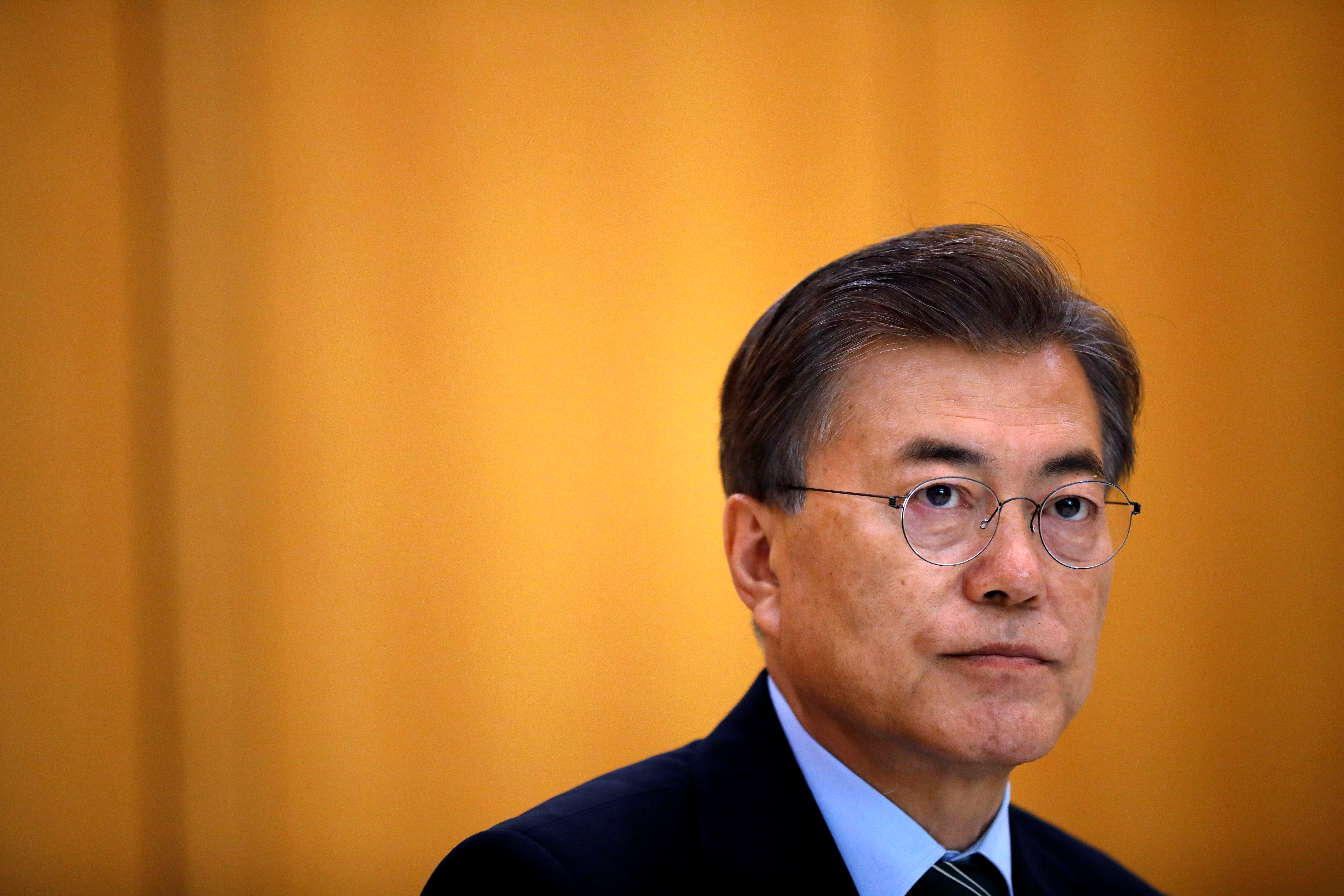Can Trump make friends with South Korea's liberal president? Because he has to.
Fingers crossed!


A free daily email with the biggest news stories of the day – and the best features from TheWeek.com
You are now subscribed
Your newsletter sign-up was successful
In the debate swirling about how to handle North Korea, one important aspect — maybe the most important aspect — seems to always get lost: Anything the United States might want to do to rein in the so-called "hermit kingdom" needs to be agreed to by the nation that would be affected most: South Korea.
With President Trump meeting today with liberal South Korean President Moon Jae-in, the stage is set to build a relationship that must not only stand the test of time, but could very well be tested in the most strenuous of ways possible: war.
Consider where things stand with Pyongyang for a moment.
The Week
Escape your echo chamber. Get the facts behind the news, plus analysis from multiple perspectives.

Sign up for The Week's Free Newsletters
From our morning news briefing to a weekly Good News Newsletter, get the best of The Week delivered directly to your inbox.
From our morning news briefing to a weekly Good News Newsletter, get the best of The Week delivered directly to your inbox.
Tensions on the Korean Peninsula are running so high that one false move, like an errant North Korea missile landing in South Korea, for example, could start a crisis taking all three nations down a path to conflict that is clearly in no one's interests. And with North Korea in possession of nuclear weapons, millions of people could die once the bombs start falling.
To make matters even worse, Pyongyang also seems intent to make sure its military might only grows with each passing day. North Korea seems close to not only testing another nuclear weapon in the coming days, but it's also on the cusp of testing an intercontinental ballistic missile, or ICBM. In the months and years to come, Kim Jong Un will likely be able to pair these two technologies together to produce a weapon that can land an atomic payload on U.S. soil, something President Trump has committed to stopping.
From here things get even worse.
North Korea has already murdered an American student, Otto Wambier, and is holding captive several other Americans as pawns. With their fate uncertain, the stage is set for a potential showdown — and where it could end up is anybody's guess.
A free daily email with the biggest news stories of the day – and the best features from TheWeek.com
Then there is poor South Korea. Not only does Seoul have to somehow deal with the North's constant threats of annihilation — Kim Jong Un just threatened to assassinate South Korea's former president, for instance — they must also deal with the constant pain of seeing their Korean brothers and sisters abused behind one of the last iron curtains on the planet.
The South also faces a reality that very few nations must deal with: thousands of pieces of artillery and missiles pointed at its capital city, ready to strike at any moment. Even though North Korea would be wiped out in any sort of military conflict with South Korea and America, it stands to reason that Seoul and large sections of the South would be turned to rubble.
Considering all of this, Trump and Moon must not only have a successful meeting, but also work to ensure they are on the same page and quickly develop a comprehensive strategy to deal with North Korea.
First and foremost, both sides need to establish a friendly, working relationship with each other. This sounds obvious, but due to domestic politics in both nations, it might actually be difficult. Trump was very harsh towards South Korea during his presidential run — calling the U.S.-Korea free trade agreement a "job-killing deal" — so he probably has some fence-mending to do. At the same time, the recently elected Moon is a dove on North Korea and had some tough words about America on the campaign trail, so he will also need to reassure his American counterparts. Indeed, today's meeting must move past the talk of both campaigns and reaffirm the alliance for the world to see — especially North Korea.
Next, Trump needs to convince his South Korean colleagues to end any challenges to the deployment of the THAAD missile defense system. While there's been recent talk in South Korea of removing this vital system, which could help shield the South from the North's missiles, it seems such concerns have eased. Still, President Trump must make it clear that such a system is in both nations' interests (keep in mind, the U.S. has 28,000 troops in South Korea that also would benefit). He must also pledge not to charge them for the system either, as he suggested months back.
Finally, both nations need to agree to a common strategy and framework when it comes to dealing with Pyongyang — one that goes beyond the obvious military questions of missiles and nuclear weapons. How would the alliance, for example, deal with a North Korean cyber attack on South Korea's nuclear reactors or electricity grid? Or, how would both nations jointly respond if Pyongyang was serious about talks to ease tensions? Clearly both sides need to know each other's redlines when it comes to the Kim regime, but also where they could work cooperatively to ease tensions.
To be fair, most first meetings of heads of state tend to feature both sides just feeling each other out, trying to get a sense of each other's motives and aspirations. But neither side has the luxury of time. One can only hope Trump and Moon can become the best of friends — and fast.
Harry J. Kazianis is director of defense studies at the Center for the National Interest, founded by former U.S. President Richard M. Nixon.
-
 The 8 best TV shows of the 1960s
The 8 best TV shows of the 1960sThe standout shows of this decade take viewers from outer space to the Wild West
-
 Microdramas are booming
Microdramas are boomingUnder the radar Scroll to watch a whole movie
-
 The Olympic timekeepers keeping the Games on track
The Olympic timekeepers keeping the Games on trackUnder the Radar Swiss watchmaking giant Omega has been at the finish line of every Olympic Games for nearly 100 years
-
 Epstein files topple law CEO, roil UK government
Epstein files topple law CEO, roil UK governmentSpeed Read Peter Mandelson, Britain’s former ambassador to the US, is caught up in the scandal
-
 Iran and US prepare to meet after skirmishes
Iran and US prepare to meet after skirmishesSpeed Read The incident comes amid heightened tensions in the Middle East
-
 Israel retrieves final hostage’s body from Gaza
Israel retrieves final hostage’s body from GazaSpeed Read The 24-year-old police officer was killed during the initial Hamas attack
-
 China’s Xi targets top general in growing purge
China’s Xi targets top general in growing purgeSpeed Read Zhang Youxia is being investigated over ‘grave violations’ of the law
-
 Panama and Canada are negotiating over a crucial copper mine
Panama and Canada are negotiating over a crucial copper mineIn the Spotlight Panama is set to make a final decision on the mine this summer
-
 Why Greenland’s natural resources are nearly impossible to mine
Why Greenland’s natural resources are nearly impossible to mineThe Explainer The country’s natural landscape makes the task extremely difficult
-
 Iran cuts internet as protests escalate
Iran cuts internet as protests escalateSpeed Reada Government buildings across the country have been set on fire
-
 US nabs ‘shadow’ tanker claimed by Russia
US nabs ‘shadow’ tanker claimed by RussiaSpeed Read The ship was one of two vessels seized by the US military
